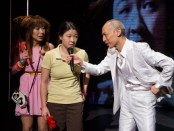Fefu and Her Friends
While María Irene Fornés' "Fefu and Her Friends" is considered a feminist statement, in performance the play seems not to be very revealing about women or their positions other than the fact that the cast is entirely female. Set among the very rich in the 1930’s, the play is liberated only to the extent that the women have enough money to do what they wish. With its attractive sets and stylish clothes and the novelty of moving from one set to the other, the play seems to be rather a period piece than a statement of women’s lib. Unlike such all-female plays as Hazel Ellis’ "Women without Men," Clare Boothe’s "The Women" and Jane Chambers’ "Last Summer at Bluefish Cove," "Fefu and Her Friends" does not have a lot to say although it remains entertaining throughout. Of course, it is possible that a women critic might have a very different take on this work. [more]




